
9 Most Common Mistakes Investors Make When Choosing a Financial Advisor (And How to Avoid Them)
When it comes to planning for retirement, one of the biggest regrets investors face is not having enough money – and more often than not – the reason isn’t due to how much was invested up front. Sometimes, it’s because of the capital being invested into the wrong financial instrument, along with these other 8 things people most often overlook.
When the journey to start looking for a financial advisor starts, you tend to be in a comfortable place in life. Your bills are paid. You have money saved in the bank. Your career is going well. If you have a family, they are probably well fed and taken care of as well.
The last thing you want to do is put any of the people or situations listed above at risk. Especially when you want to plan accordingly for the rest of your life, and that of your future generations.
When you think about the risks at hand, there are plenty of them. A little over a decade ago, we heard of Bernie Madoff being sentenced to prison time for running a Ponzi scheme. If you have even taken a glance at the crypto world, you can see fraud running rampantly, as many operators of crypto exchanges were pushed into bankruptcy, along with many other individual investors who saw their hard-earned money invested into platforms and exchanges that were wiped out.
It may make you wonder. Would a financial advisor put any of my money into something as risky as crypto?
We're on a mission to reduce the overwhelmingly high percentage of financially unhealthy American citizens (65%) to as close to zero as possible.
Join us on our mission and sharpen your wisdom about all things money related.
It’s a good question to think about, considering that Goldman Sachs and other prestigious investment firms have set aside departments to operate in the crypto space. Aside from this question, there are many other risks that come with the territory of financial investments.
To better prepare yourself, you will want to look over these 9 situations to ensure you don’t fall victim to any unforeseen situations due to the mistake of not being prepared.
Why Choosing the Right Financial Advisor Matters for Your Future
Before we get into any of that, however, let me share with you the most common mistakes that people make when they are choosing a financial advisor.
These are the top 5 most common Mistakes Made by Investors When Choosing a Financial Advisor
- Investors don’t pick an advisor without interviewing them first
- Investors don’t take the time to ensure the advisor’s strategy aligns with their own personal financial goals
- Investors do not take the time to confirm their credentials and licenses to ensure that they are being regulated to uphold the law and abide to a fiduciary duty to their respective client
- They do not take the time to understand how they are paid, or the commission structures being each product that are offered
- They go more off of reputation as opposed to selecting the advisor they trust the most
When selecting a financial advisor, investors should beware of the many mistakes they could make along the way. Taking shortcuts or not researching the proper credentials can lead to costly and avoidable mistakes.
But picking the right financial advisor can have lucrative rewards. As such, investors should take the time to consider these mistakes and take steps to avoid them.
Here are the 9 most common mistakes that investors make, along with how to avoid them.
1. Investors Do Not Take the Time to Understand That There Are Different Types of Advisors
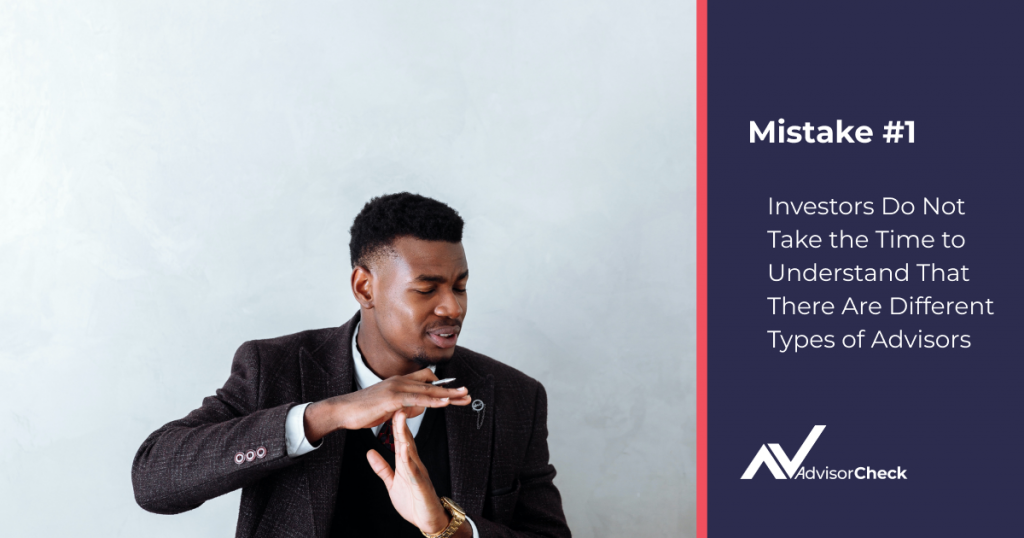
Not all advisors are built the same. Some work strictly in the stock market, while others may want you to purchase a life insurance policy that may not align with your retirement objectives while you are still a living member of society.
Because there are so many types of advisors out there, investors should understand the different types of advisors out there and the roles they play. Take a moment to explore the three main types of advisors below so that you can pick the right one for your investment needs.
Investment Advisor Representative (IAR): Investment Advisor Representatives must adhere to a fiduciary standard. This means they are bound to always act in their client’s best interest. They also have the ability to offer a wide range of services, such as comprehensive financial planning, investing, and tax advice.
Typically, an Investment Advisor Representative is a fee-based advisor. As they are also required to adhere to a fiduciary standard, you can understand that your best interests are in mind when they are offering you services. However, some Investment Advisor Representatives may not follow the fiduciary standards that they have abided by, and those can be seen in a background check prior to working with them, by using a system like AdvisorCheck. On top of being a fiduciary, you can often seek comfort in the Investment Advisor Representative because they also act as a financial planner as well. That means that they can work with your budget to figure out exactly what you need to do at the various stages of life you encounter.
Registered Representative (RR): Registered Representatives reps typically work at a brokerage firm and have limited abilities to offer services outside of the scope of their employer’s products. They are usually held to a suitability standard, which means they must ensure that any product they suggest is suitable for the client’s financial needs.
Due to Martin Scorsese’s movie that hit the big screens back in 2013, featuring both Leonardo DiCaprio and rising star Jonah Hill, people have started to look at Registered Representatives in a negative light. It didn’t start with that movie, however. There was one before that which came out at the start of the century in the year 2000, with many stars ranging from Ben Affleck to Vin Diesel. In the movie, "Boiler Room" you could sell people calling people from all professions, from physicians in their practice to the local family man who is at home and watch as their lives unravel through a series of penny stock schemes with negative consequences.
Aside from the bad reputation that the powers that be in Hollywood have portrayed these types of advisors as, they still do have some benefits. They are able to help clients invest, but mainly just for the management of money – they do not have the same privileges of being able to provide financial planning services to their clients as an Investment Advisor Representative is able to do. While that limitation can be quite daunting if you plan to work with a Registered Representative, there is also a third category that combines both the IAR and the RR into a Dually Registered Representative.
Dually Registered Representative: These advisors are registered as both an IAR and an RR. This allows them to offer a range of services, including comprehensive financial planning and investment advice, both from an independent perspective as well as access to a wide array of investment products from their broker-dealer. It is important if your advisor is dually registered that you understand their role for the specific financial advice that they are offering to you.
While the three types of advisors mentioned above are regulated and adhere to the guidelines of the Securities Exchange Commission, there is also the insurance agent, along with many unregulated advisors that you will want to watch out for as well.
The insurance agent usually is able to sell property and casualty insurance, along with annuities. However, some firms do hire insurance agents who act as Registered Representatives as well. By having this combination of credentials, an insurance agent who is also a financial advisor, can offer additional insurances on top of life and casualty insurance, along with the annuities. They could also include variable insurance products, along with variable annuities into their offerings.
One day, you may encounter someone who is trying to push you into buying preferred shares of a company that is listed on a stock exchange like the Pink Sheets, as opposed to a reputable exchange like the Nasdaq or the New York Stock Exchange. The person who is doing this may not even be a financial advisor, let alone someone who is licensed.
On top of that, cryptocurrencies have become quite popular over the past few years. There are a lot of blatant scams where people are raising money through the sale of tokens or coins that are traded on ancillary cryptocurrency exchange platforms. If there is a low market cap for the investment you are considering, you should really think five times before making the move, as your capital could be immediately wiped out.
Research indicates 65% of Americans are financially unhealthy.
Make sure you are a part of the 35%.
There are many other people who play roles in the financial space and do not have licenses at all, so you will need to make sure that you are working with someone who is registered and make sure that they either meet your goals, with a fiduciary or suitability standard that meets your investment goals.
2. Hiring the First Financial Advisor You Meet Without Comparing Options

Let’s say someone you know was going to get a divorce. The first attorney they meet says they want a retainer of $10,000. For exemplary purposes, let’s say your friend only has $5,000.
Would it make sense for your friend to go and look for another $5,000 to start the divorce process?
Anyone who would fall into this unfortunate situation would understand that the lawyer’s retainer upfront is just the starting costs to get a divorce finalized. If they were to move forward with that particular attorney, their total divorce costs could end up being anywhere from $20,000 to the six-figure mark.
Understanding that, so many people tend to go with the first person they meet when they look for a financial advisor. Sometimes, that may not even be the right choice for some individuals. Referencing back to the divorce example again, let’s say your friend meets with two more attorneys. One will take a retainer for $5,000, while the other will do it for $2,000.
As more options appear on the table, it becomes easier to make an informed decision on which route is best to take. Sometimes, some people may even take it a step further and purchase books and other material to study how the law works and see if there is an even cheaper do it yourself option.
While the do-it-yourself option is a lot more risky, just understanding that there are more options than just going with the first person you meet will help widen your perspective of just how complex the world of finance can be, along with what you need to look out for.
We all need help getting our finances in order throughout our lifetime.
Look through our database to find the most trustworthy financial advisors in your area.
Aside from cost alone, there are a lot more things to consider when hiring an attorney, such as their specialization, where they are licensed and how many cases they have won. The prices of the paralegals matter as well, along with the years of experience the primary attorney at the firm has as well. When it comes to financial advisors, there are so many variables you need to consider as well, so you can’t just go with the first one you meet.
As tempting as it is to hire the first financial advisor you meet, it’s important to interview a few advisors before making a decision. The mock divorce situation above should clearly showcase just how complex a process like this could be, and when we are discussing matters that are as important as your money, you want to make sure whoever you end up working with is the absolute best first possible.
What should you do?
First begin with asking questions about their experience, qualifications, and fees to ensure they are the right fit for your investment needs.
This is an excellent opportunity to confirm any potential conflicts of interest. It’s important to feel comfortable with the advisor you choose, so there needs to be a balance between your intuition and the advisor’s experience.
Taking more time upfront to do some research and have multiple conversations can give you a better understanding of who is the right advisor for you. And potentially save you from making a costly mistake down the road.
3. Choosing a Financial Advisor with the Wrong Specializations

Imagine you want to set up a college fund for your children. When you meet your financial advisor, they start talking about a Roth IRA and the benefits of annuities. Immediately, you are able to tell that there is a clear set of priorities that differ from what you’re looking to achieve, versus what the financial advisor is able to offer to help you achieve your objective in order to take care of your children.
Once you become well versed in the world of finance, you will come to learn that financial advisors come with a range of specializations, from retirement planning to investment advice. Make sure you find an advisor who has the skills and experience to handle the specific area of your finances that require attention.
If you think of an advisor who specializes in insurance and only carries those licenses, they would only be able to provide insurance solutions like life insurance or a fixed annuity. However, if this advisor is also a Registered Representative, they would be able to offer variable annuities as well.
The limitations around the licenses a particular financial advisor carries greatly impacts which products can be offered to you, the investor.
Investment Advisor Representatives are a bit different than the Registered Representative counterparts. While a Registered Representative may sell products in their offerings to investors, an Investment Advisor Representative tends to focus more on the services that are offered. This is the biggest contrast when you think of the two primary types of investment advisors.
If you were planning to pick up products and you end up with a service-based advisor, it could cause detriment down the line, and the opposite holds true as well. So, make sure you thoroughly research what specializations your advisor has to ensure you do not fall into a situation where you are not being offered the products and/or services that you need to achieve your financial goals.
You will be able to narrow down a significant portion of advisors if you avoid mistake #2 and take time to interview the different advisors. During this interview process, be sure to understand what areas of financial planning they specialize in and ensure that their experience fits your needs.
Here is some direct advice on how to maximize the experience of figuring out which financial advisors will meet the specializations of what you expect to achieve with your financial planning goals:
- Write out a list of what you are hoping to achieve
- Describe in detail when you want to achieve it
- Detail out how much you are able to contribute to the specific investment type in order to make it happen
- If calculators are available for your specific goal, utilize them and be prepared for what to expect (add in a variable of around 20% just in case your investment doesn’t go as planned)
- Do some preliminary research on what financial tools and products are available in order to help you achieve the desired success you are looking for
- Clearly state out the goals you want to achieve in the very first meeting with your prospective financial advisor, to ensure that they are potentially capable of achieving them with their rolodex of products
The mismanagement of personal finances cost Americans a total of more than $352 billion in 2021.
Read the white paper to see how much your household may have been impacted.
When you take the time to clearly state out what you want and what you are looking to achieve, it not only shows the advisor that you did your homework; it also allows you the opportunity to go out there and internalize the information that you are receiving from each individual investment advisor you encounter. This gives you ample opportunity to dissect the conversations, products and/or service offerings to ensure you are able to match up which package best suits you, to ensure you do not end up with an advisor who specializes in the specifications that do not meet your needs.
“I have found that the investors who achieve the most success are the ones who are clear on what they want to accomplish and articulate that with as much detail as possible,” Robert McGrath, the Chairman of AdvisorCheck, reinforced.
4. Working with a Financial Advisor Whose Strategy Conflicts with Yours

It’s essential to find an advisor whose personal financial strategy aligns with your own. Every investor has a different approach to investing, and each advisor will have their own philosophy.
For example, some advisors take an aggressive approach to investments, while others are more conservative with their strategies.
As you interview advisors, ask them about their financial strategies and make sure you choose one that resonates with your goals and risk tolerance.
One of the best ways to do this is to describe to your financial advisor how you handle risk in your own life when it comes to the financial decisions you have made up to this point. After you do so, listen intently to how the financial advisor responds.
If the advisor starts talking about all of the strategies that they would do which goes against your overall investment and risk strategy, that may not be the best financial advisor for you to work with. However, if they start discussing strategies that they have either personally utilized or implemented for their clients that sounds similar to what is in line with your risk and tolerance levels, then that advisor may be more closely aligned to your own personal objectives.
5. Not Asking about Credentials and Licenses

You may be surprised, but there are many people who operate under the guise of a financial advisor who may not even be licensed, such as financial planners. The industry attracts so many people who want to portray themselves as wealth experts, as that is where the money is. It’s even right there in the name of what type of advisors they are; financial.
With this in mind, you will be able to see a wide scope of people who operate in this field. Some work at broker dealers. Some work at investment and hedge funds. Others work at life insurance agencies, and those are within the licensed category.
We empower new and seasoned investors to take charge of their finances.
Get the most reliable financial resources delivered straight to your inbox.
While there are some legitimate people who operate in this space, there are also many who are not.
Make sure the advisor you choose is properly licensed and credentialed. Ask them to provide proof of their licenses, certifications, and other credentials.
In the United States, all financial advisors must be registered with the Financial Industry Regulatory Authority (FINRA). You can check their background and credentials on FINRA’s website.
Moreover, you can confirm whether they passed the Series 6, Series 7, Series 63, Series 66, or other exams required for professionals in the financial services industry.
Just to shed some light on the different types of licenses one could attain, when I was working for a broker/dealer in 2008, my boss had me study for the Series 7, and once that would’ve been completed had the economy not collapsed and the United States entered a recession, then I would have either studied for the Series 63 or 66 afterward.
In 2010, when I almost became an employee with AXA Equitable, they wanted me to take a life insurance test. Had I passed it (I was maybe 5% off from a passing grade), I would have had to take the Series 6, along with the Series 63. Due to these differences in licenses, each of those two companies that I could have ended up working at had very different products and/or services that would have been offered to the clients I could have ended up working with.
6. Assuming Big Firms Guarantee the Best Financial Advisors
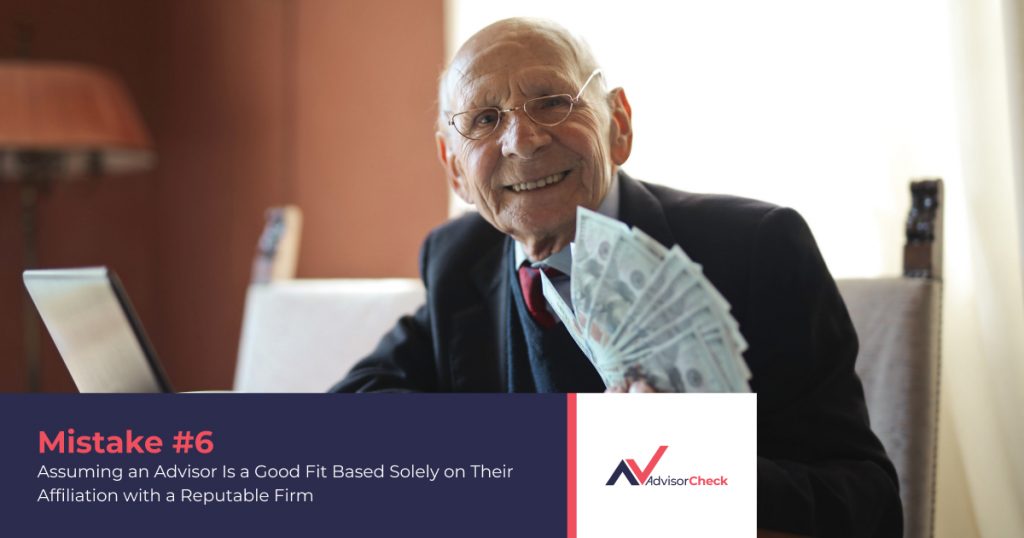
It goes without question that Goldman Sachs has made quite a name for themselves in the world of finance. So much so that when it comes to the four management styles that McKinsey and Co. discusses in their leadership discussions with their clients, one of the particular management styles is referenced heavily based off of how they operate their firm. It’s the strategy or bringing on the very best of the best, and outside of the world of finance, you have probably seen this occur in the world of sports, such as when the Los Angeles Lakers built an entire team of stars around Kobe Bryant, along with how Mike Trout, Shohei Ohtani and other renowned players all team up together on the Los Angeles Angels.
Overall, working with a large reputable firm’s advisor has some advantages. Firms provide stability and stronger controls, as well as potentially superior tools and knowledge.
However, a firm’s status and/or reputation is not the primary reason why you should hire an advisor. Just thinking about the sports examples, there have been players on both of those teams who may have performed well or been a top draft choice yet performed poorly when the clock started ticking on the court or in the field. The same is true when it comes to financial advisors at a firm; not every advisor is cut from the same cloth, and some high achieving workplaces also end up recruiting people who may have clashing personalities with people who are more empathetic and caring, along with many other nuances that can only be seen after meeting. With an advisor.
Choose an advisor because they are the best fit for you, not because of the firm they are associated with.
7. Not Understanding How Financial Advisors Get Paid
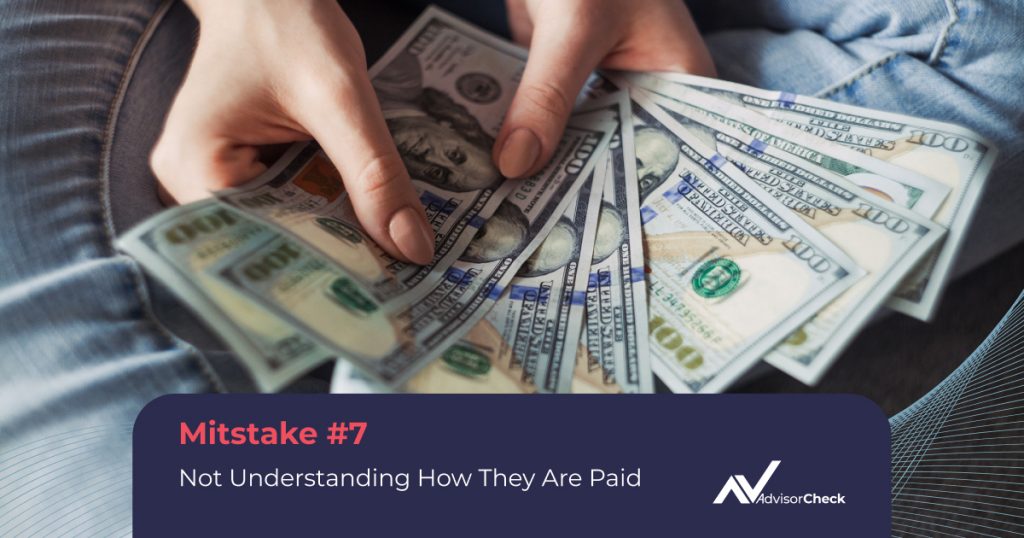
When it comes to the world of financial advisors who work in regulated industries, there tends to be disclosure when it comes to how an associate earns their money. There is a reason for that – and it is to ensure that you, the investor, can make an informed decision of whether the financial advisor is looking out for your best interest or for a huge payday.
Outside of the world of regulated financial advisors, that doesn’t seem to be the case.
Due to these factors, you want to make sure you understand the fees associated with any financial services you receive. Some advisors charge a flat fee – a percentage of the assets they are managing for you or an hourly rate – for their services, while others may charge a commission or performance fee. While the typical fee of a financial advisor who has money under management is one percent, this number varies from firm to firm. You will want to inquire with each financial advisor to see what their individual fees are for money under management, as this number can vary depending on where the advisor works. It’s important to understand all the fees associated with an advisor, so you don’t get caught off-guard by any hidden costs. Having a thorough understanding of an advisor’s fee structure can help you make the right decision when it comes to hiring a financial advisor. There’s other advisors who peddle products and have commissions. Do you know what type of commissions they earn? What percentage? Some brokers can take up to 8.5% of a mutual fund sale, and 1-5% of bonds. Make sure to do your research and ask the advisor what commissions they are expecting to be earning from each product.
To give you an example of just how important understanding fee structure is, think back outside of finance and into the world of real estate. In 2008, the American economy crashed, and we entered into a recession. First, the real estate market fell apart, then the stock market followed. A huge reason for this was due to adjustable-rate mortgages. An adjustable-rate mortgage is a loan that is provided at a lower interest rate for a term of around three to five years, then adjusted to the current market rate at the end of the term.
These adjustable rate mortgages were intended for real estate investors who wanted to buy and flip homes, however a large number of real estate agents pushed for new home owners to move into these loans to fit them into a budget that would not be able to afford a conventional mortgage, while loan processors just happily approved the loans as they came in, whether or not they foresaw the risk one would take in if they had a lower income and wouldn’t be able to make payments at an interest rate that was two to three points higher.
As these real estate purchasers were using these properties as their own personal homes as opposed to investments they could flip, when the time for the loan to adjust came in, they started to lose their homes and caused many banks to go bankrupt, along with many individual homeowners ending up in foreclosure.
This is an example of why disclosure and understanding all of the fees associated to working with a financial advisor are so important, because if there is a missing component, an investor could fall victim to a similar type of circumstance as the unsuspecting homeowners who went into foreclosure in 2008.
8. Leaving Your Family Out of the Financial Advisor Decision
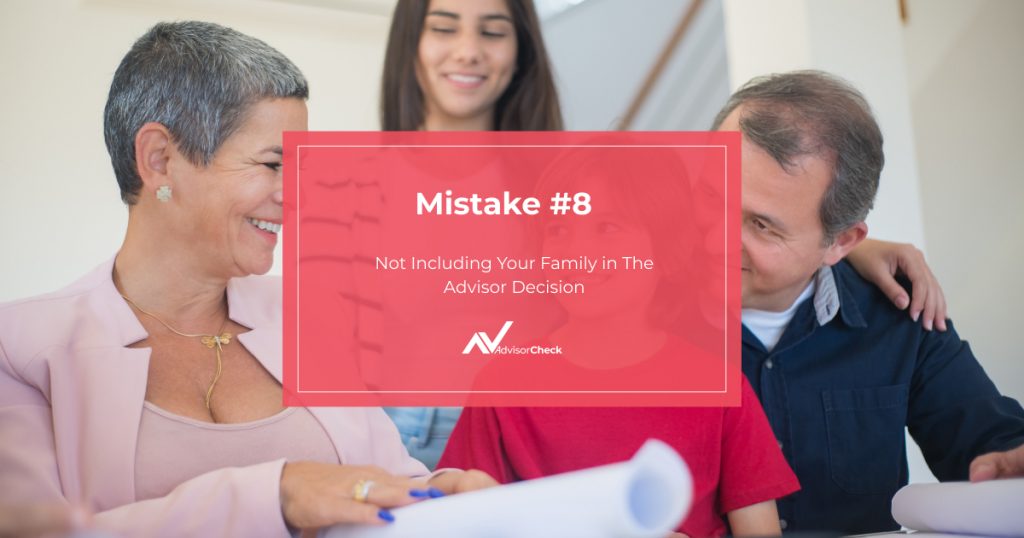
The selection of an advisor impacts all those associated with your estate. A spouse, a significant other and/or adult children are likely to be future beneficiaries or have direct responsibility of your estate. Not having the family involved in the initial selection of an advisor could lead to misunderstandings, lack of cohesiveness and the lack of trust in the advisor. Conversely, involving the family in the initial advisor decision will increase trust and help ensure the likelihood of a smooth future transition of your estate.
I can understand how some people may have hesitations about this, however. I remember back when I tried to go over a budget to stay within with my now former wife. She would look at the Excel spreadsheet and her eyes would gloss over as if she couldn’t understand it. There’s absolutely nothing wrong with that; some people understand material better than others – and her expertise is in the world of medicine, where she is extremely talented at what she does.
As our divorce progressed, she thought she could get a lot of money out of me because when it came to business, she didn’t really grasp the concept of gross and net profit, so she thought I made a lot more money than I did, when many of my expenses went to payroll and other business necessities.
While she did get some money out of the situation, her financial literacy has increased immensely, and I am proud of her for that.
With traditional families, however, people do tend to be on the same page when it comes to financial decisions. So, I would implore you to take the time to speak with your spouse and/or your children so they are all aware of what kind of decision you will be making as a family. A family should move as a tight knit unit, and one of the best ways to ensure that happens is to have a deepened understanding of financial decisions – decisions that you make together.
9. Not Trusting Your Instincts When Choosing a Financial Advisor
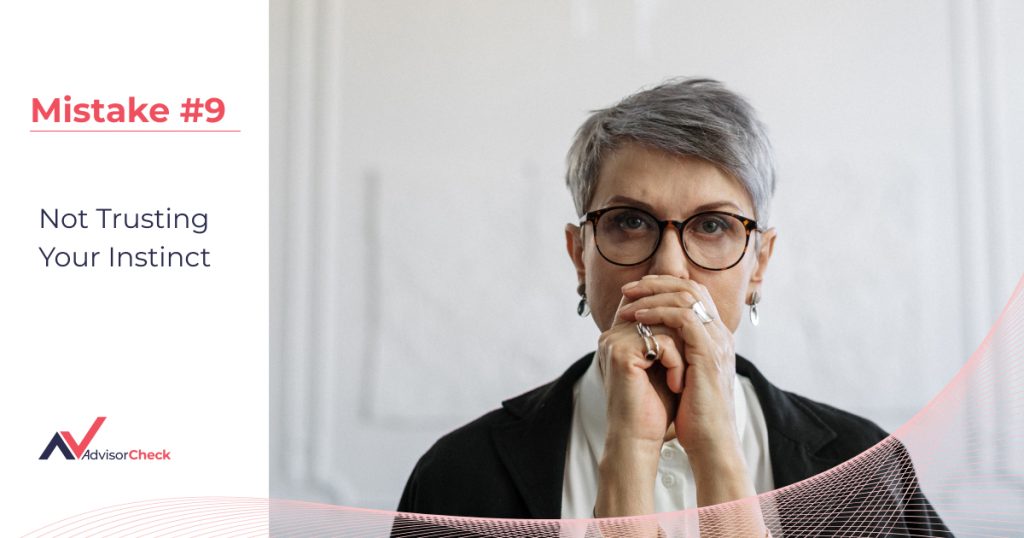
It is important to do all your homework and avoid the previous 8 mistakes, but the ultimate decision when selecting an advisor is yours. It is easy to not trust your instincts and be swayed by others’ opinions or the credentials of an advisor or their firm. However, this could be a mistake and when making that final decision you must trust your own instincts and select the advisor that you trust the most. Over time you will feel most comfortable with and be most open with the advisor that you trust the most.
If you think about it, who you end up choosing as your financial advisor will probably be the same person you will be discussing financial matters with until the end of your life. This decision, quite unfortunately, is going to be as important as who you have already chosen or will choose as a life partner as well. Some financial advisory relationships may also end up outliving some marriages, so for some, this decision may be even more important than the latter. Choose wisely, as this is a decision you do not want to leave up to chance.
Finance behemoths like Bloomberg and the Wall Street Journal make you pay to learn about finance. We share our insights to expand your financial literacy for free.
Conclusion
Choosing a financial advisor might seem challenging, but it doesn’t have to be. By understanding the common mistakes that investors make when picking a financial advisor, you can make an informed decision and feel more confident in your choice.
If you’re interested in looking for a financial advisor in your area, go to AdvisorCheck and type in the city and state where you live, to start to sort through local financial advisors in your area.
If you already are in the process of searching for a financial advisor, type in the names of the advisors you have interviewed or plan to interview and meet with in the box at the top of AdvisorCheck. Also, sign up for a free AdvisorCheck membership to get our insights delivered straight to your inbox.
Written by: Leonard Kim
Fact Checked by: KJ Kim
Reviewed by: Dan Hattori
Your go-to source for:
- Breaking out from living paycheck to paycheck
- Countering inflation with saving hacks
- Saving for your or your kid’s futures
- Turning home ownership from a dream into a reality
Disclosure
The information provided in this article was written by the research and analysis team at AdvisorCheck.com to help all consumers in their financial journeys, by providing the resources and the insights to help improve one’s financial health, make it through recessionary and inflationary periods of time, and save their earnings to use them towards building a secure financial future.
Unauthorized reproduction or use of this material is strictly prohibited without prior approval. Any parties interested in content syndication, references, interviews, or PR, please contact our marketing team at marketing@aimranalytics.com
AdvisorCheck.com is an independent data and analytics company founded on the principles of helping to provide transparency, simplicity, and conflict-free information to all consumers. As an independent company providing conflict-free information, Advisorcheck.com does not participate, engage with, or receive funding from any affiliate marketing programs or services. To become a free AdvisorCheck member, visit advisorcheck.com/signup.
Most read
Subscribe to our newsletter
Get the latest on finding, evaluating, and working with financial advisors; delivered right to your inbox.

The content of video and blog articles are for informational and entertainment purposes only and do not constitute investment, tax, legal, or financial advice. Always consult with a qualified professional before making any financial decisions. The views expressed are those of the author and do not reflect the opinions or recommendations of any affiliated entities.